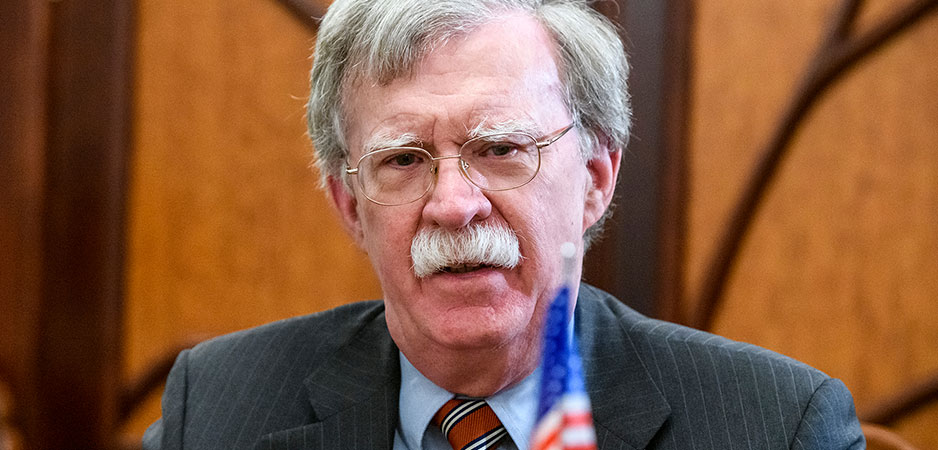In a curious article for The New York Times, John Gans delves into an analysis of the perennially bizarre phenomenon known in Washington by the name of John Bolton. The article uses the case of Bolton, the former national security adviser, to examine what Gans calls “the anarchy” at the core of the Trump administration’s modus operandi. At the same time, he unwittingly unveils some basic truths about recent trends in US culture at this curious moment of the nation’s history.
Gans sets the scene by describing a personal anecdote of his near encounter with Bolton in the US State Department cafeteria back in 2005, at a time when Bolton was President George W. Bush’s candidate for ambassador to the United Nations. The anecdote carries no information of substance. Gans uses it as a device to establish his credibility as a witness to history. This lends a few grams of weight to his pretention of digging below the opaque surface to reveal Bolton’s true motives as the author of the latest insider book on President Donald Trump’s dysfunctional White House.
US Culture’s Unavowed Love Affair With Destruction
Gans seeks to avoid what some on the Democratic side have tended to do, who have promoted Bolton to the status of a whistleblower speaking truth to power. Instead, he suggests that Bolton, a Republican, symbolizes everything that’s wrong with a regime that The New York Times has been seeking to bring down for the past three and a half years. Gans aims his arrows at a target greater than Bolton himself: “Mr. Bolton’s lonely, self-interested crusade against Mr. Trump says volumes about where Washington finds itself.”
To bring the point home about Bolton’s lack of any larger civic motive, Gans writes: “It is hard to see any more in Mr. Bolton’s crusade beyond self-interest: for vengeance, attention and sales of the book.” He then turns his gaze away from Bolton, the loner whom he described at the beginning of the article, to bring home his main point: “Mr. Bolton and many others have struggled amid the anarchy and been reduced to the mere pursuit of self-interest.”
Here is today’s 3D definition:
Self-interest:
The core virtue in US culture inspiring the admiration of others, which, to be fully realized and justify the success it aims at achieving, must deny that it’s about one’s own self by creating the impression that one’s acts are designed to promote the good of the many
Contextual Note
Wishing to prove that self-interest is the virus that has infected the regime, Gans cites the term three times, always with a negative connotation, as a synonym for egoism and selfishness and the failure to consider the needs of others. But in US culture, self-interest is commonly seen as a virtue. Gans does implicitly acknowledge the positive value associated with self-interest in one of the citations, when he claims that everyone in the Trump administration has “been reduced to the mere pursuit of self-interest.” Clearly, self-interest itself is not to blame. It’s the fact that the motivation of such people is reduced to “mere self-interest.”
In US culture, self-interest represents the launching pad for everything that becomes socially productive and beneficial to the community. It’s the infant crying for its needs to be met by others, with no awareness of those others’ needs. Social maturity develops from that base. The future adult builds a relationship between its own self-interest and everyone else’s. Socialization is all about balancing the force of multiple self-interests. Americans know that their lives will be defined by the need to affirm themselves and establish their territory in a competitive society. Politicians, referred to as “public servants,” are expected to go beyond “mere” self-interest to represent the “public interest.”
Although foundationally individualistic, Americans do acknowledge the existence of communities that take shape along political, ethnic, linguistic or cultural lines. But such communities are still defined more by shared interests than by identity. They generally fail to rise to a status equal to the more sacred self-interest of individuals. Such collectivities are typically seen as ephemeral collections of self-interested individuals.
Even the nation is ultimately perceived as an interest group. This explains why US society often appears to be on the brink of civil war. No one is ever quite sure which interest group is in control. US foreign policy is famously defined as the implementation of actions intended to defend not the nation but American interests. Those interests include access to markets, competitive advantage for Americans, control of resources in other regions or simply business opportunities for US firms. The actions that compose foreign policy can include military invasion, regime change, war, sanctions and covert activities aimed at undermining local authority or destabilizing local cultures.
Other cultures across the globe, to varying degrees, acknowledge selfish instincts as part of human psychology, but, unlike US culture, they refuse to see it as the foundation of all human motivation. Asian cultures, for example, see collective needs as fundamental and individual desires as secondary. Americans thus have difficulty understanding the force and solidity of Chinese nationalism because, in their view, the policies of the nation stifle individuals’ self-interest. They believe that coercion alone explains the Chinese population’s acceptance of a regime that fails to recognize what they see as a spirit of independence.
Historical Note
John Gans is correct when he observes that “Mr. Bolton and many others have struggled amid the anarchy and been reduced to the mere pursuit of self-interest.” But this point requires some historical nuance. Gans wants his readers to believe that what he calls “anarchy” is an anomaly, a particular state that applies to Trump’s administration. In reality — to the extent that self-interest is the reigning principle in the culture — anarchy is the baseline of American political organization. Government in the US can be defined as the minimal capacity to manage competing points of view within a permanent magma of self-interested anarchy and maintain a semblance of order.
Politics in nation-states always tends toward hyperreality. Queen Elizabeth I’s pageants and masques, her court’s elaborate displays and rituals — just like Louis XIV’s royally-imposed baroque fashions and hairstyles a century later — constituted the cleverly designed trappings of a form of hyperreality aimed at consolidating royal power. In modern democracies, to achieve its effects, hyperreality depends on rituals and relationships that have less to do with fashion and more to do with military technology, popular entertainment and the rhetorical power of audio-visual media. In all cases, the success of government-imposed hyperreality revolves around key personalities acting predefined roles.
Gans sees “anarchy” in the current US administration only because Donald Trump’s brand of hyperreality uses the innate tendency toward self-interested anarchy built into the American psyche to establish his personal form of authority. To a large extent, it has worked because it resonates with a background ideology that is grounded in self-interest. Trump’s weakness lies in the perception by many that “mere” self-interest is vulgar.
The game of managing one’s own and other people’s self-interest in the lobby-friendly culture of Washington has traditionally relied on cultivating a veneer of European-style diplomacy. It uses an appeal to rational, though often passably hypocritical, explanations rather than emotional outbursts and irate tweets. It is designed to raise the appearance of moral standing above “mere self-interest.” Barack Obama was the president who mastered that art to near perfection.
Traditional Republicans right up to George W. Bush have used a different tactic, while at the same time paying lip service to a form of decorum they call the “rule of law.” Republican presidents before Trump have consistently appealed to an abstract ideal of Providence that manifests itself through economic and military might. It casts each self-interested American into the role of an agent of divine will. God is not just on the American side; God is American. No royal splendor at the human level is required since Americans are the subjects of the king who reigns over the universe, the being who continually blesses America (and its troops) at the end of every political speech.
Trump’s “anarchy” is different only to the extent that he has eschewed the goal of promoting the fiction that there is something beyond self-interest informing the government’s decisions. His hyperreality is powerful but incomplete. In times of crisis, it risks losing its force.
*[In the age of Oscar Wilde and Mark Twain, another American wit, the journalist Ambrose Bierce, produced a series of satirical definitions of commonly used terms, throwing light on their hidden meanings in real discourse. Bierce eventually collected and published them as a book, The Devil’s Dictionary, in 1911. We have shamelessly appropriated his title in the interest of continuing his wholesome pedagogical effort to enlighten generations of readers of the news. Click here to read more of The Daily Devil’s Dictionary.]
The views expressed in this article are the author’s own and do not necessarily reflect Fair Observer’s editorial policy.
Support Fair Observer
We rely on your support for our independence, diversity and quality.
For more than 10 years, Fair Observer has been free, fair and independent. No billionaire owns us, no advertisers control us. We are a reader-supported nonprofit. Unlike many other publications, we keep our content free for readers regardless of where they live or whether they can afford to pay. We have no paywalls and no ads.
In the post-truth era of fake news, echo chambers and filter bubbles, we publish a plurality of perspectives from around the world. Anyone can publish with us, but everyone goes through a rigorous editorial process. So, you get fact-checked, well-reasoned content instead of noise.
We publish 2,500+ voices from 90+ countries. We also conduct education and training programs
on subjects ranging from digital media and journalism to writing and critical thinking. This
doesn’t come cheap. Servers, editors, trainers and web developers cost
money.
Please consider supporting us on a regular basis as a recurring donor or a
sustaining member.
Will you support FO’s journalism?
We rely on your support for our independence, diversity and quality.






